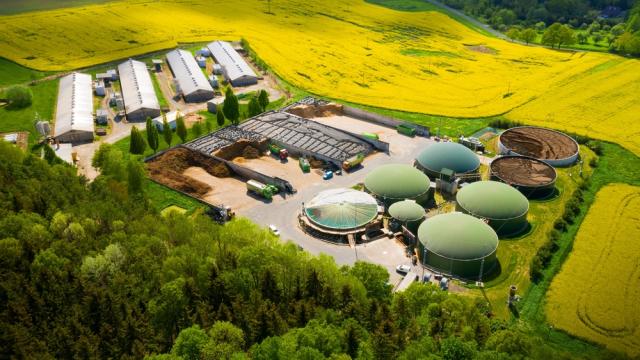
Renewable natural gas facilities are typically found in rural areas. (Source: Shutterstock)
Synthica Energy LLC will break ground July 27 on a facility in St. Bernard, Ohio, that utilizes the company’s process of converting food waste into renewable natural gas, or RNG.
The facility will be the first of its kind in greater Cincinnati and divert nearly 200,000 tons of waste from local landfills and sewers each year, the company said. Its close proximity will cut costs and diesel emissions as manufacturers travel shorter distances to truck waste.
The anaerobic under construction will use technology transforming waste into renewable energy. In the past, many digesters have been located on farms mainly processing animal waste, the company said. As technology has evolved, advanced storage, odor control and pretreatment options have become available, allowing digesters to be compatible with urban areas.
“The benefits of organic waste management are clear—environmental protection, investment, job creation,” said Sam Schutte, founder and CEO of Synthica St. Bernard. “We’re on the front end of a movement that’s fusing new technology with environmental consciousness, and it’s creating a mutually beneficial opportunity for businesses to better manage their waste and communities to create more eco-friendly footprints.”
Synthica, launched in 2017 by Schutte, has multiple long-term agreements in place to manage waste from several local manufacturers.
“Renewable natural gas is created by breaking down organic feedstocks from sources such as industrial food waste and food scraps, municipal wastewater, or carbon-rich materials,” added Schutte. “All of these sources can be found in the St. Bernard area and the numbers are just staggering. The average American home wastes 250 pounds of food every year, and food waste from industrial sources just in Ohio tops 8 million tons annually.”
Synthica is evaluating business models and potential properties for additional plants. Schutte added that Synthica’s aggressive business model will shift the entire paradigm.
“The implications for Cincinnati can be profound and generational,” he said. “Removing tons of waste from landfills is one thing, but the economic and environmental considerations run even deeper.”
Recommended Reading
Darbonne: ‘The Dance’ of US Policy Leaving Energy Mid Slip
2024-08-30 - The 1909 Matisse painting known as “The Dance” demonstrates the outcome of one of the U.S.’ pillars falling down.
Analyst: US NGL Market Tightens Links to Crude, NatGas Production
2024-08-30 - A boost in propane and ethane development is tied to the opening of the Matterhorn Pipeline in the Permian, evidence of the increasingly closer link between different sectors of the energy industry.
EDF Renewables Secures Investment in Solar Energy Storage Project
2024-08-30 - Power Sustainable Energy Infrastructure acquired a 50% stake in EDF Renewables North America’s Desert Quartzite Solar+Storage Project in California.
Energy Transition in Motion (Week of Aug. 30, 2024)
2024-08-30 - Here is a look at some of this week’s renewable energy news, including a more than $2 billion hydrogen and atmospheric gases facility in the works.
Australian Shale Wildcatter Tamboran Spuds First 2-Well Beetaloo Pad
2024-08-30 - Tamboran investor Helmerich & Payne is drilling the 2-mile laterals, while fellow investor Liberty Energy has a frac fleet en route to complete the wells, Tamboran Resources reported.





